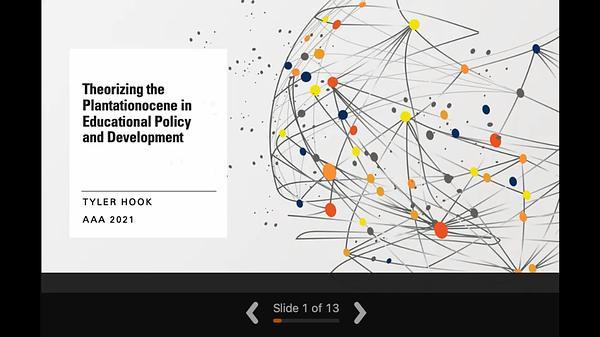Would you like to see your presentation here, made available to a global audience of researchers?
Add your own presentation or have us affordably record your next conference.
keywords:
colonialism and post colonialism
reflexivity
policy
Seeds are transgressive. Gathered within them are potentialities, of becomings, of symbiotic eco-systems, and of generative, flourishing futures. Seeds transform as they grow, and they are always connected to their environments. They are humble; learning is how they live. Like seeds, the Association for the Anthropology of Policy (ASAP) is metabolizing, learning from and responding in solidarity against the literal and figurative violences whose past year manifestations are rooted in intersecting global racisms, capitalisms, and systemic inequities: a deadly pandemic, the state repression of peaceful dissent, and the impunity of nationalistic terrorism, to name a few. At the same time, we lift up as balm, inspiration, and duty the multiple everyday struggles that we witness, participate in, learn with, and commit ourselves to. We are growing a near-future and long-term anthropology of policy that is grounded in justice and liberation, an experiential experiment in challenging legacies of systemic oppression in ASAP, AAA, and anthropology more broadly. As a practical starting point, we take ASAP’s initial commitments on Anti-racism, derived from the Raising Our Voices 2020 cross-sectional event: citational justice; inclusive curricula, representation, recruitment and retention; mentoring and support; and alliances, activism and organizing. As a dispositional departing point, we embrace the humble and persistent (and transgressive, beautifying, and generative) seed. Our guiding questions are: What can an inclusive, transformative anti-oppressive and liberation-oriented anthropology of policy and anthropology more broadly look like? How does transformative anthropology “do” authentic reflection, reckoning, and rearticulation in its intellectual traditions, research methods, teaching, genres of production, professional pathways, and other practices, including and surpassing the acknowledgement, recognition of our own responsibility, and transcendence of racist, oppressive and colonial histories and presents? How can we nurture and celebrate alternate sensibilities that attune us to an anthropology that not only embraces but embodies a humble, inclusive, transformative, and liberation-oriented sub-discipline, discipline, and associated professional practices and pathways? Seeds need nurturance. Let us gather together through this roundtable and continue the work started by many others before us. We especially encourage participation beyond the panel members so as to creatively aspire through our discussion in our principles and praxis towards an anthropology otherwise.

